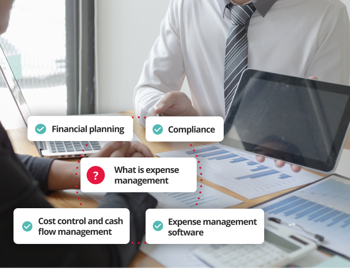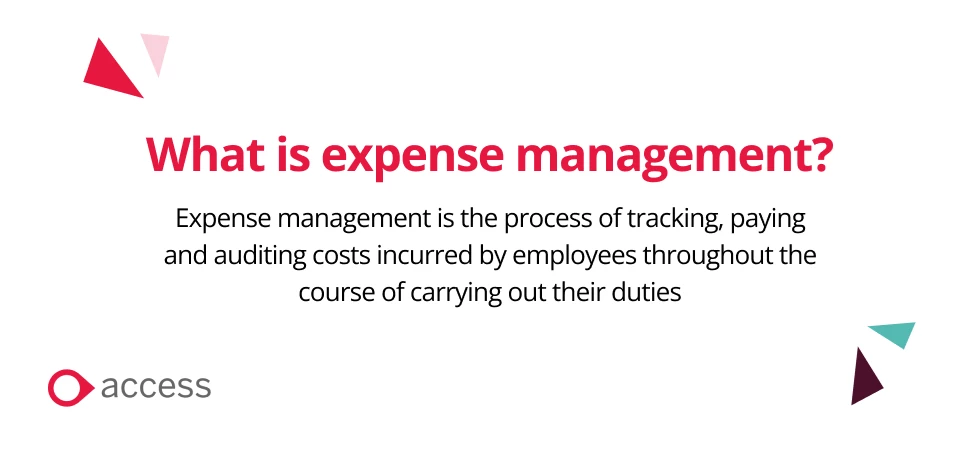
Whatever the size of your company, you’ll have certain expenses that you need to keep track of. Expense management is really important for a company’s financial health, allowing you to ensure smooth operation while also planning for the future.
However, it can be a time-consuming process, particularly for large organisations with a high headcount and a variety of different expenses. Likewise, it can be daunting for smaller companies with limited administrative resources, particularly if they are experiencing a period of growth and are finding manual methods unsuitable. This is where tools like HR payroll software can help.
In this guide, we’re going to explore travel and expenses management in more detail, sharing expert tips and explaining how choosing the right software can help to streamline expense management for your business.
What is expense management?
Expense management is the process of tracking, paying and auditing costs incurred by employees throughout the course of carrying out their duties. These expenses include travel, sustenance, entertainment, SaaS fees, stationery and more. They can be made through petty cash, company credit cards, or paid out of pocket by employees.
The process is usually carried out by accounting and finance, HR, managers and supervisors, or a combination of these. There are various different ways to track and process business expenses, including manual methods and using expense management software.
Importance of expense management
However it’s carried out, managing expenses essential to ensure that any costs incurred by employees are legitimate and in the interests of the business, as well as being an essential part of financial planning.
Let’s look at its importance of in more detail.
Cost control and cash flow management
By understanding what expenses employees are likely to incur for certain activities, and how much they are, businesses can better budget for these instances in the future. This can help you to keep costs down by providing insights into what should and shouldn’t be covered by your expense policy, and what monetary limits to set for certain types of expenses.
Effective expense management also improves cash flow, as it allows businesses to plan for upcoming costs, and means that less money is tied up in expenses. This is particularly important if you rely on employees paying their own expenses out of pocket, as the funds may not be available once it comes time to reimburse them.
Financial planning
Expense management supports both short- and long-term financial planning for your business, as it offers greater visibility into what funds are being used for. This enables strategic decision making that can help your business to enjoy financial stability.
Business expenses are also an important part of filing your business’ tax return, as they constitute deductions and need to be declared to calculate profits. Understanding the expenses your business often incurs can help with tax planning, helping you to maximise profits and keep your tax bill down.
Compliance
Whatever industry you’re in, and however large or small your business, you’ll need to make sure that your financial processes comply with legal regulations and internal policies. This helps to minimise the risk of accounting errors, fraud, and legal issues arising from noncompliance, as well as supporting the financial wellbeing of your business.
Engaging in or allowing the practice of fraudulent activities can seriously damage your business. Following best practices helps to protect your reputation within your industry, public opinion, and the eyes of your employees. Make sure you understand your HR compliance obligations, and regularly audit your practices to make sure they’re sufficient.
What types of expenses are involved in expense management?
There are many different types of expenses, and the size and nature of your business will determine which ones you will need to deal with.
Petty cash expense management
Having petty cash on hand is a quick way to provide employees with the money they need for small expenses. However, it’s considered quite old fashioned these days, and is extremely hard to keep track of, particularly for businesses with multiple locations. If you use petty cash, effective management is essential to ensure traceability, minimise the risk of theft, and ensure that there is sufficient cash available when it’s needed.
Out-of-pocket expense management
Employees may be required to pay for their own expenses, either as part of their company’s policy or in the event of unexpected expenditure. They must then fill out a claim form for reimbursement, which is usually added to the weekly or monthly payroll. This process is time consuming both for employees and finance teams, and requires careful management of receipts. Out-of-pocket expenses also rely on the employee having the means to make the purchase in the first place, which is of particular importance when it comes to reimbursing them in a timely manner.
Travel expense management
Travel expenses tend to be incurred when employees need to travel to off-site locations, such as for client meetings, conferences, or to deliver or attend a training session. These expenses often fluctuate, and could include fares for buses, trains, taxis and planes, as well as a mileage allowance for those using their own vehicle.
Entertainment expense management
Businesses may incur expenses when hosting clients, employees or business associates for entertainment purposes. This type of expense can include meals, event tickets, travel, accommodation, and a variety of other forms of hospitality. Proper management of entertainment expenses is essential to ensure that business funds are being spent wisely, and that these activities aren’t in violation of your organisation’s gifting and bribery policies.
Who handles employee expense management?
The person or team responsible for employee expense management varies between organisations. Depending on the size and structure of the business, the process may be overseen by members of the accounting or HR department, as well as managers and supervisors at varying levels of seniority.
Accounting and finance
As it relates directly to the business’ finances, an accounting or finance team is often responsible for overseeing the expense management process. This includes budgeting, tracking expenses, analysing financial data, and reporting on expenditure patterns. Due to the specialised nature of accounting, this department is ideally placed to ensure compliance with financial regulations while effectively managing cash flow.
HR
Expense management also involves ensuring that employees are acting in accordance with company policies, as well as involving the repayment of out-of-pocket expenses through payroll. For these reasons, the HR department may be in charge of managing expenses. Understanding how employees engage with expenses can also provide insights into areas of training and development that need to be addressed, which the HR team can also action.
Managers and supervisors
Managers and supervisors tend to have control over their departmental budgets, as well as knowing if and when their employees need to attend training courses and conferences, or access particular tools and software. This positions them well for overseeing and approving employee expenses within their own departments, although the actual processing of the expenses may still fall to accounting or HR.
Tools for employee expense management
There are several different options when it comes to employee expense management, each with their own benefits and drawbacks.
Managing expenses manually
Manual travel and expense management tends to involve giving paper receipts to the department that oversees expenses, and may involve reconciliation through spreadsheets or outdated HR systems. While this is a low-cost option in terms of hardware and software requirements, it’s a time-consuming process with a high administrative burden and significant risk of errors.
As well as the inefficiencies of this approach, it also relies on employees asking for, retaining and submitting physical receipts to prove the legitimacy of the expense. These can easily be lost or forgotten, potentially leaving you or the employee out of pocket due to unknown costs.
Corporate credit cards
Using a company credit card helps to quickly and efficiently track payments made by authorised employees. Transactions can be viewed online and pulled directly into your accounting software for easier identification of each expense.
However, it’s much harder to impose spending limits when using a credit card, and banking statements don’t always align with the end of the month, which is when most other financial transactions are reconciled. This can leave loose ends and lead to departments going over budget unnecessarily.
Expense management software
Expense management software is specifically designed to handle these types of transactions, offering complete visibility of each transaction. It’s able to integrate directly with payroll software, streamlining the reimbursement process for employees that have paid for expenses with their own funds.
As well as making expense management quicker and more accurate, this type of software also tends to have built-in reporting and analytics capabilities, helping you to identify spending patterns and plan department budgets.
Mobile or desktop expense management software app
Some expense management software providers also offer supporting mobile and desktop apps that make it even easier for employees and company stakeholders to submit and manage expenses. In particular, mobile apps help to improve the accuracy and efficiency of submitting receipts, as they can be snapped with a phone camera and instantly uploaded for later processing.
What is expense management software?
Expense management software is a digital tool that uses automation and cross-platform connections to support the entire process of submitting, approving and paying expenses. It enables companies and their employees to manage travel bookings, submit expense reports, approve or reject expense claims, facilitate reimbursements, and track expense claims in real time.
By combining these essential steps into a single platform, expense management software minimises the risk of lost expense data, while automation helps HR teams to save time and dedicate resources to more complex tasks. The software can also be used for sophisticated expense reporting to support budgeting decisions.
Expense management is a part of PeopleHR’s professional HR software package, allowing you to integrate key business processes within a single platform for even greater efficiency and visibility.
Traditional expense management vs. Automated expense management
Traditionally, the management of expenses involves collecting receipts and matching them to transactions. This can be very time consuming, as receipts aren’t always present, meaning the legitimacy of the expense can’t be proven, and payments may have been made through a number of different methods, which all need to be processed differently. For out-of-pocket expenses, employees will need to be reimbursed through payroll.
Modern expense management digitises the process, for example as part of an HR payroll solution. This makes it easier for employees to submit expense claims, and for businesses to track and process them. By linking directly to payroll functions, an expense management system can also streamline employee reimbursement, so they’re not left out of pocket.
Streamline your expense management process
Implementing expense management software is a great way to improve the accuracy and efficiency of your expense processes. As businesses adopt more and more technology for their daily operations, it makes sense for even small businesses to take advantage of the powerful benefits offered by expense management software.
If you’re looking for a reliable expense management solution, PeopleHR’s HR payroll software is a great choice. By combining this functionality with core HR processes, it helps to further streamline the entire expense management process, from submission through to approval and reimbursement.
If you’d like to see how our software can support your business, check out our free trial, or get in touch and we’ll be happy to advise you.
